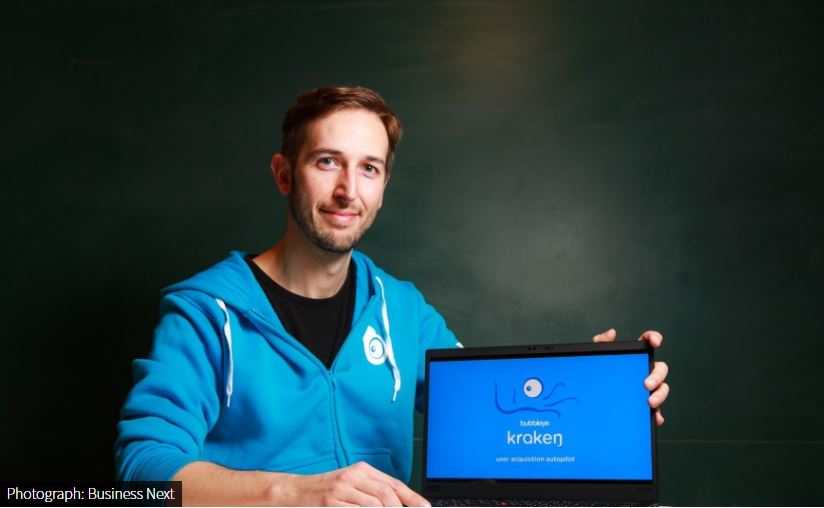Taipei-based Italian entrepreneur breaks into international markets with his solution helping game apps acquire real users

Imagine you’re a mobile game developer, who invests millions of dollars in developing a game. After around a year of struggle with the team, you finally release it on App Store and Google Play — only to realize it’s a drop in the ocean of the six million games in these online stores.
As you try and build stickiness into your product, you might need to double down on paid user acquisition. It’s indeed one of the few, if not the only, ways to be noticed in the deluge of game apps when you don’t have a large user base of early adopters. Unfortunately, here comes another challenge: statistics show that 40% of the online ad spending goes to fake users and 59.5% is wasted on users who don’t even spend a dime on the app. In other words, investing on these ads is pretty much like pouring money down the drain.
This is what Stefano Roncari encountered when he was working on his previous startup in Beijing. He and his team spent a lot on promoting their game but didn’t see many users download it on their phone, let alone paying for it.
Most games die exactly because of the low return on ad spend, he told Business Next. “The average cost for acquiring a user is much higher than the revenue you can get from a user.”
Looking into the black box
Fraud is one of the most common issues around online ads, including fake clicks and installations. “On mobile phones, every app is like a black box,” Mr. Roncari said. Unlike on a web browser where cookies are available, it’s almost impossible to know how the user uses the app, what they search, or even if they’re real users.
It can also happen that an ad publisher “steals” an organic user, claims that the advertiser acquires it by running a pay-per-download campaign on one of its pages, and asks for a fee. “It’s easy to cheat but difficult to catch a cheater,” he said. What’s worse, an ad publisher can charge the advertiser more for a user they buy from another publisher.
To help game publishers avoid these pitfalls and attract high quality users, Mr. Roncari co-founded Bubbleye in Taipei in 2016 to launch Kraken, “the world’s first user acquisition autopilot.”
To maximize ROI, the AI-powered solution optimizes the advertising strategy — how it allocates budget by channel, country, and ad placement — as it monitors and controls campaigns across multiple platforms and channels in real time. It would take some weeks for a group of human advertising managers to achieve the same results.

“Every second, it sees who has seen your ad, who has clicked on it, how many of them have installed, in which location they are, what time they click it, and how they behave after installing your app,” Mr. Roncari explained. “All these data are used to verify if the users are authentic and assess how much they’re worth.” The autopilot can also stop allocating budget to sites that bring in fake users and re-invest in others that bring in real users right away.
To use their service, an advertiser needs to offer “a definition of a good source of users” for the AI to learn, adapt, and spend the budget in the goal of achieving positive ROI.
“We provide a dashboard for our clients, but they normally check it only once in a week because everything is automated.” Mr. Roncari also said there isn’t yet a similar auto-optimization solution for apps in the market.
Unlike ad platforms that charge advertisers by cost per acquisition, Bubbleye prides itself on positioning the autopilot as an unbiased, third party platform so that it can not only identify fraud and inefficiencies but actively deal with it to make better use of ad budgets. “We bring in good users, [without concerning] where they come from,” Mr. Roncari concluded. “We become game publishers’ friend.”
Also, since they’re not involved in the cash flow (between ad platforms and advertisers), their clients are willing to share their data, collected from mobile measurement partners, with them while they wouldn't do so with other ad platforms.
Bubbleye Mobile Targeting : Kraken
From Taiwan to the world
Mr. Roncari told us that many people ask them if they would automate advertising for other types of clients in the future besides game publishers. “Every mountain is climbed one step at a time,” he said, noting their solution applies to many other industries.
Besides the team’s experience in gaming industry, the sheer size of the market also prompts them to focus on user acquisition for game apps first. According to Mr. Roncari, a mid-sized game publisher spends around $10M to $50M to gain online exposure every month, and one fourth of the mobile advertising spending worldwide, about $50B, goes to mobile games.
Headquartered in Taipei, Bubbleye now serves clients across the world, from East Asia, West Asia, North America, to Europe. “Because of word of mouth, we get to offer services to clients we have never thought before,” Mr. Roncari said with excitement.
When asked about why basing his business in Taipei, he said it allows easy access to engineering talent, funding, and global markets. Most importantly, he lives a happy and productive life here.
Selected to join the first MOX (Mobile Only Accelerator) cohort, he and his team had visited Taipei for the first time after staying in Beijing for 13 years, and decided to relocate within a week.
2020 seems to be a year of turning point for the five-year-old company. With a new round of funding raised months earlier from Taiwan-based Darwin Venture, it plans to expand its team and go global in 2021. The first stop will be Japan, whose gaming market is a “big missing part” in their business, and next, Europe and North America.
〔Original :Meet Startup @ TW〕
https://meet.bnext.com.tw/intl/articles/view/46162